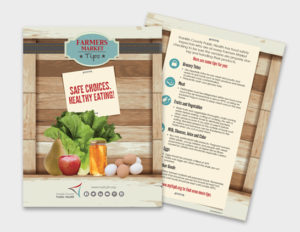Overview
Franklin County food inspection reports are available online. There is no grade assigned to the reports, but the complete inspection reports are posted to allow the public to conveniently view all violations and comments that were noted during inspection.
We have also utilize a sign program that allows restaurants and other businesses we inspect, such as groceries and convenience stores, to inform customers they have been inspected by Franklin County Public Health and let them know the inspection report is available online.
The sign program is a voluntary program. The food service and retail food establishment operators are not required to display an inspection sign, but they will be offered the sign after the completion of an inspection. However, regardless of the operator’s decision to post the inspection sign, their inspection reports will be available online.
Definitions
This is an unannounced inspection. All areas of the facility will be inspected to ensure compliance with regulations.
There are four possible “risk” levels of food licenses. The level is assigned based on the relative risk associated with how the business operates. Level one is the lowest risk and level four is the highest. Below is a brief description of the types of licenses:
- Risk Level 1 has very limited food handling or preparation. The business may provide things such as pre-packaged food or fountain drinks.
- Risk Level 2 may involve more employee food handling, but the type of food handling still constitutes a lower risk than a business that prepares a variety of food.
- Risk Level 3 involves a higher risk because of concerns for proper cooking procedures, proper holding temperatures, and processing raw food products.
- Risk Level 4 involves the greatest risk because it may involve serving raw, ready-to-eat potentially hazardous food; serving food to a primarily high-risk clientele, or preparing food which requires multiple temperature controls to preclude bacterial growth.
This type of inspection is conducted in a level 4 food service operation. It focuses on tracking all potentially hazardous food items from arrival to consumption.
This inspection is conducted in a level 4 retail food establishment to determine that all procedures are being conducted according to Chapter 3717 of the Ohio Administrative Code.
This is an inspection conducted as a result of a complaint received by Franklin County Public Health. The complaint will be investigated and the results of the inspection and investigation will be discussed with the operator of the facility.
These are violations that if left uncorrected, are more likely to contribute to foodborne illness. Examples of critical violations include improper cooking temperatures and improper holding temperatures.
These are violations that are not directly related to the cause of foodborne illness. Examples of non-critical violations include maintenance and cleaning issues.
These are foods which require temperature control. This includes meats that are raw or cooked, cooked vegetables, raw seed sprouts; or cut melons.
All TCS food must be held at 41 °F or below or at 135 Degrees Fahrenheit or above. The area between is often referred to as the “Danger Zone”. This is the temperature range that allows certain bacteria to multiply rapidly.
Food items that are ready-to-eat are items that do not require washing, cooking.

